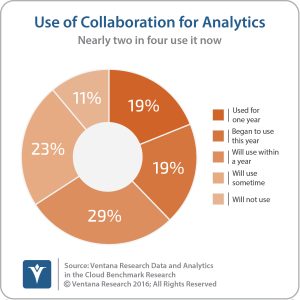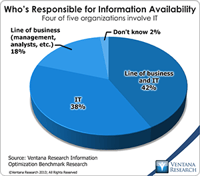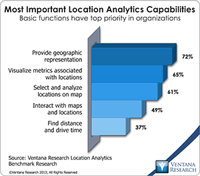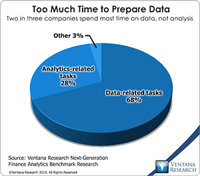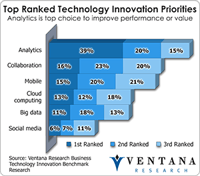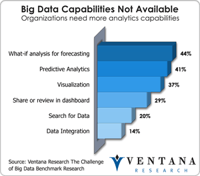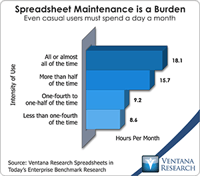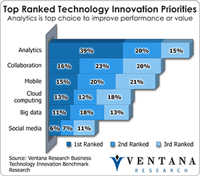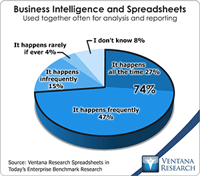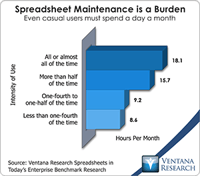More than 13,000 self-described “data and visualization nerds” gathered in Austin, TX, recently for Tableau Software’s annual customer conference. In his inaugural keynote, Tableau’s new CEO, Adam Selipsky, said that nearly 9,000 were first-time attendees. I was impressed with the enthusiasm of the customers who had gathered for the event, cheering as company officials reviewed product plans and demonstrated new features. This enthusiasm suggests Tableau has provided capabilities that resonate...
Read More
Topics:
Tableau,
Analytics,
Business Intelligence,
Visualization,
DataPrep
IBM redesigned its business intelligence platform, now called IBM Cognos Analytics. Expected to be released by the end of 2015, the new version includes features to help end users model their own data without IT assistance while maintaining the centralized governance and security that the platform already has. Our benchmark research into information optimization shows that simplifying access to information is important to virtually all (97%) participating organizations, but it also finds that...
Read More
Topics:
Big Data,
Mobile Technology,
Wearable Computing,
Operational Performance,
Analytics,
Business Analytics,
Business Intelligence,
Business Performance,
Governance, Risk & Compliance (GRC),
Information Management,
Operational Intelligence,
Uncategorized,
Visualization,
Cognos,
Information Optimization,
Risk & Compliance (GRC),
Watson,
cognos analytics
Tableau Software’s annual conference, which company spokespeople reported had more than 10,000 attendees, filled the MGM Grand in Las Vegas. Various product announcements supported the company’s strategy to deliver value to analysts and users of visualization tools. Advances include new data preparation and integration features, advanced analytics and mapping. The company also announced the release of a stand-alone mobile application called Vizable . One key message management aimed to promote...
Read More
Topics:
Big Data,
Tableau,
Mobile Technology,
data viz,
Operational Performance,
Analytics,
Business Analytics,
Business Intelligence,
Business Performance,
Governance, Risk & Compliance (GRC),
Information Management,
Operational Intelligence,
Visualization,
Information Optimization,
Risk & Compliance (GRC)
IBM’s Vision user conference brings together customers who use its software for financial and sales performance management (FPM and SPM, respectively) as well as governance, risk management and compliance (GRC). Analytics is a technology that can enhance each of these activities. The recent conference and many of its sessions highlighted IBM’s growing emphasis on making more sophisticated analytics easier to use by – and therefore more useful to – general business users and their organizations....
Read More
Topics:
Big Data,
Planning,
Predictive Analytics,
Governance,
Human Capital,
Budgeting,
Customer Performance,
Operational Performance,
Analytics,
Business Analytics,
Business Performance,
Cloud Computing,
Financial Performance,
Visualization
In his keynote speech at the sixth annual Tableau Customer Conference, company co-founder and CEO Christian Chabot borrowed from Steve Jobs’ famous quote that the computer “is the equivalent of a bicycle for our minds,” to suggest that his company software is such a new bicycle. He went on to build an argument about the nature of invention and Tableau’s place in it. The people who make great discoveries, Chabot said, start with both intuition and logic. This approach allows them to look at...
Read More
Topics:
Sales Performance,
IT Performance,
Operational Performance,
Analytics,
Business Analytics,
Business Intelligence,
Business Performance,
CIO,
Cloud Computing,
Customer & Contact Center,
Information Applications,
Information Management,
Location Intelligence,
Visualization,
Data
It has become evident from the advancements we’ve seen in the business analytics market that the use of visualization is now becoming mainstream. In my analysis of the market last year I wrote about the pathetic state of dashboards, where the assumption in the business intelligence software industry is that placing four to six charts or tables of data in a screen and publishing to business users can create business intelligence. That assumption has yet to be proven and is completely irrational,...
Read More
Topics:
IT Performance,
Analytics,
Business Analytics,
Business Intelligence,
Information Applications,
Information Management,
Location Intelligence,
Operational Intelligence,
Visualization
The spreadsheet is one of the five most important advances in business management over the last 50 years. It has changed all aspects of running an organization. It was the original “killer app” that made people go out and buy personal computers. So you see I’m enthusiastic about spreadsheets, but I realize they have limits that must be respected to work efficiently. One of the more important findings from our benchmark research Spreadsheets for Today’s Enterprise was about the time spent in...
Read More
Topics:
Sales Performance,
Supply Chain Performance,
Office of Finance,
Reporting,
enterprise spreadsheet,
Operational Performance,
Analytics,
Business Analytics,
Business Intelligence,
Business Performance,
Customer & Contact Center,
Financial Performance,
Information Applications,
Information Management,
Visualization,
Workforce Performance,
Risk,
benchmark,
Financial Performance Management
Information technology for business is changing rapidly as organizations demand innovation to help them discover insights and facts. Our research into business technology innovation found analytics to be the top priority in 39 percent of organizations. Businesses feel pressure to be better, faster and smarter in operating processes, and understanding their various types of information is a key to success. Businesses are looking to capture value from all types of information both within the...
Read More
Topics:
Big Data,
Sales Performance,
Supply Chain Performance,
Event discovery,
Operational Performance,
Analytics,
Business Analytics,
Business Intelligence,
Business Performance,
CIO,
Customer & Contact Center,
Financial Performance,
Information Applications,
Information Management,
Location Intelligence,
Operational Intelligence,
Visualization,
Workforce Performance,
Data,
Data Discovery,
Information Discovery
I’ve been using spreadsheets for more than 30 years. I consider this technology tool among the five most important advances in business management of the 20th century. Spreadsheets have revolutionized many aspects of running an organization. Yet as enthusiastic as I am about them, I know the limits of desktop spreadsheets and the price we pay if we fail to respect those limits. The essential problem arises when people use desktop spreadsheets for purposes beyond what they were originally...
Read More
Topics:
Sales Performance,
Supply Chain Performance,
Office of Finance,
Reporting,
enterprise spreadsheet,
Operational Performance,
Analytics,
Business Analytics,
Business Intelligence,
Business Performance,
Customer & Contact Center,
Financial Performance,
Governance, Risk & Compliance (GRC),
Information Applications,
Information Management,
Visualization,
Workforce Performance,
Risk,
benchmark,
Financial Performance Management
Read More
Topics:
Sales Performance,
Supply Chain Performance,
Office of Finance,
Reporting,
enterprise spreadsheet,
Operational Performance,
Analytics,
Business Performance,
Customer & Contact Center,
Financial Performance,
Visualization,
Workforce Performance,
Risk,
benchmark,
Financial Performance Management
